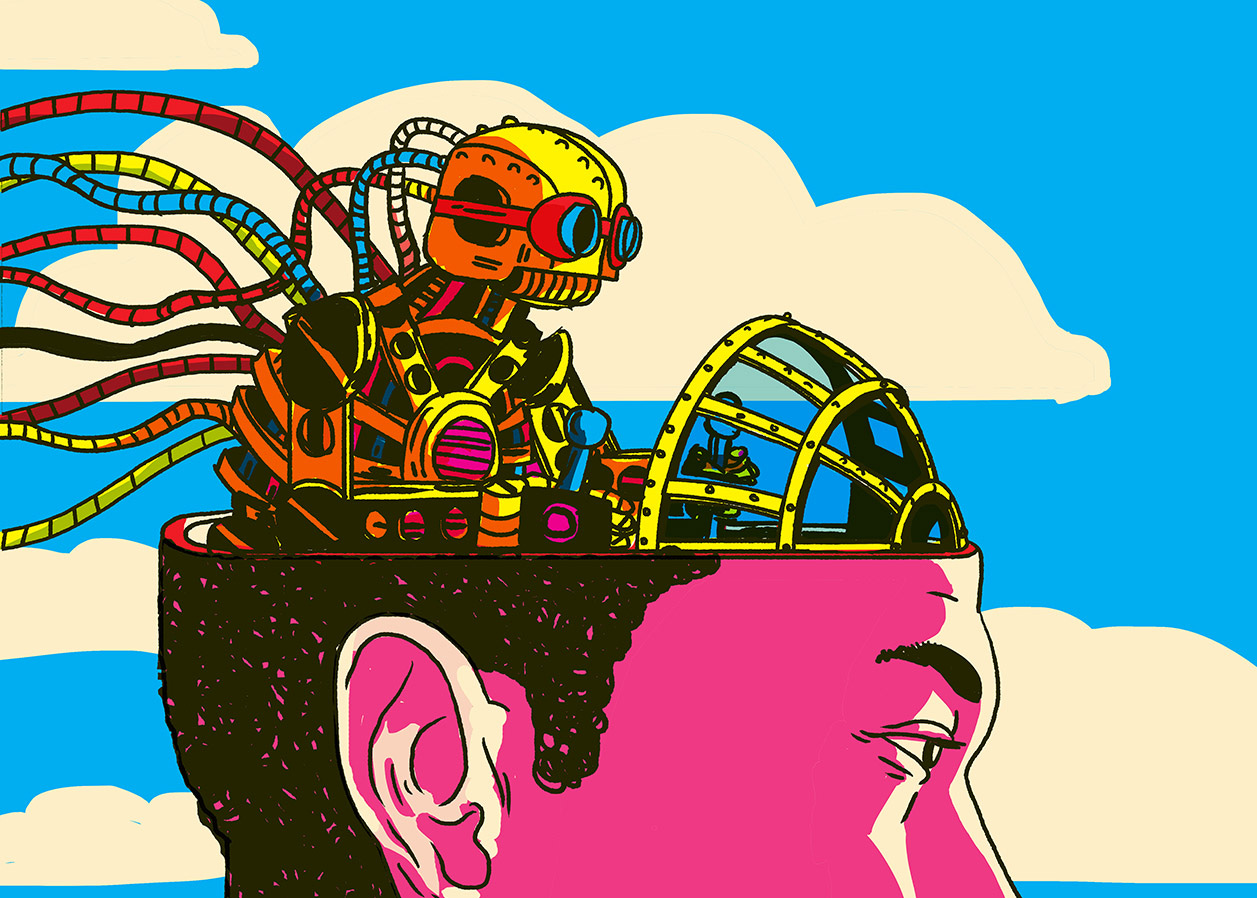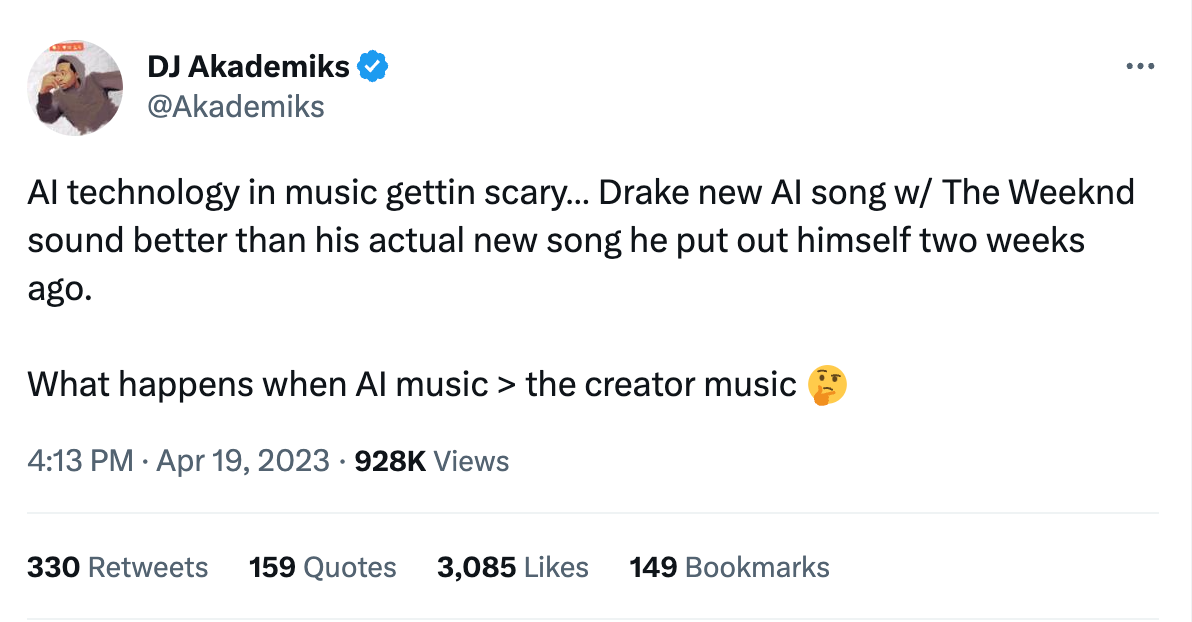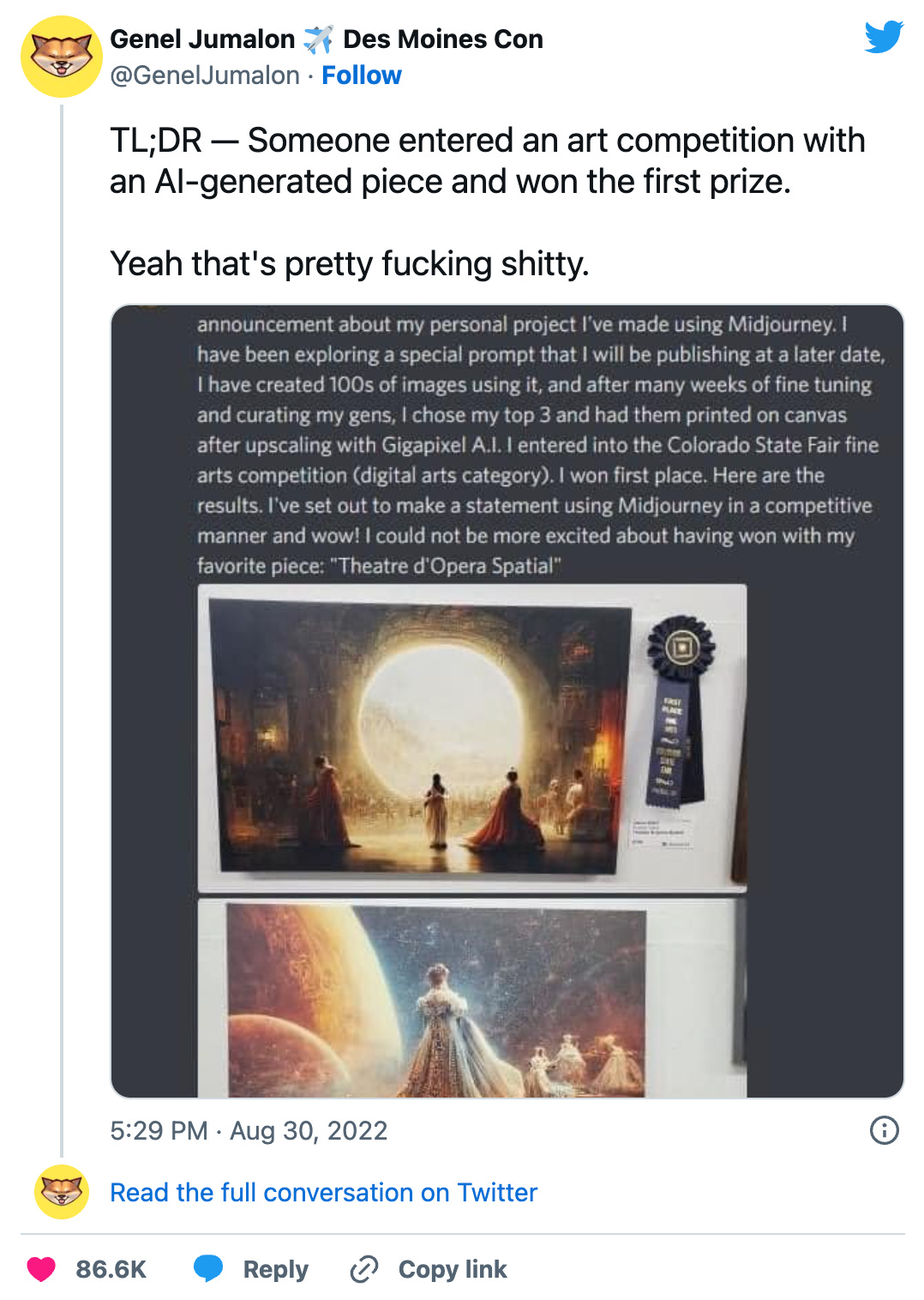
I love writing, so this is bittersweet. Here's the problem: AI is showing us that creativity, our most cherished human trait, behaves more like a well-oiled machine than we ever imagined.
For centuries, we've been romancing creativity like some mystical lover. We've been spinning tales, talking about muses and inspiration as if creativity was something divine that bestowed a special few with its gifts.
Think of Vincent Van Gogh, creating his 'Starry Night' masterpiece from a tiny cell in a mental asylum. There's no logic, no reason, only a magical transmutation of raw emotion into a spectacle of colour and form. His creativity, like many others, was shrouded in mystery. We revelled in the 'not knowing,' in the alchemy of turning personal turmoil into universally cherished art.
Creativity was the last bastion of true magic in an increasingly predictable world.
Now, the veil is being lifted.
Give a machine billions of data points. Add the power of pattern recognition. Suddenly, the mystique of creativity seems glaringly mechanical. Art, writing, and even strategic games like Go are revealed to be less divine and more like precision-based machinery.
That's the hard truth we're grappling with: our prized domains of creativity may not be as uniquely human as we thought.
Stealing the limelight
While many continue to argue AI creativity is merely a parroting act, mirroring human emotions without understanding and ripping off real artists' work, they seem to conveniently forget that all creativity is borrowed. The difference is Humans do it subtly, and AI does it blatantly.
Mark Twain said it best:
Substantially all ideas are second-hand...born of the superstition that we originated them.
And this is not a new or radical idea. Human creativity has always been about reinterpreting and building upon what came before.
Pablo Picasso, who’s own work was famously inspired by African Tribal art said, 'Good artists copy, great artists steal.' In that light, AI's 'borrowing' seems less like a cheap imitation and more like an extension of a long-standing creative tradition.
As our mechanical friends churn out creative work that steals the spotlight, we're left grappling with an unsettling realization. If a machine can generate a beautiful painting or a touching poem just by crunching numbers, what's left for us? What's special about human creativity?
The answer isn't going to lie in the end product but in the process of creating it.
In a world about to be dominated by AI-generated art, the human touch will become premium.
Silicon over starry night
Depending on who you ask, creativity has lots of interesting definitions. But the explanation I like best is that creativity produces original and meaningful work.
It's hard to deny that AI is unequivocally ticking those boxes. AI content is now matching and even surpassing human creativity.
Recently, the viral hit song- heart on my sleeve- a "duet" starring Drake and The Weeknd, dumbfounded audiences when they realised the song was entirely a product of AI. While the model was inevitably trained on countless existing tracks, every single note, lyric, and beat from the viral song was an original combination.
Many, including myself, thought the song was better than anything Drake or The Weeknd ever produced
The viral track was taken down in a matter of days and removed by all the major music streams, including youtube and Spotify, because of copyright issues.
But here's what I'm asking: if an AI creates something entirely new yet still considered a copy, doesn't that make us rethink what we mean by 'original' and 'copyright'?"
In fact, doesn't it make us rethink what we mean by creativity?
When an artist using Midjourney, a text-to-picture generative AI program, won first place at Colorado's state fair art competition, the art community was in an uproar.
People decried it as not real art. The piece was faux-creativity and mimicry. But what really counts is that this artwork moved people. It stirred emotions and made people react - just like any piece of human art would.
Isn't that the purpose of creativity? To evoke, provoke and invoke? So if this AI-generated artwork can accomplish that, why should we deny its creative essence?
Creative obituary
Many continue to argue that it's not the AI that's creative but the people who coded it. However, the programmers just set the initial conditions. The AI generates the final work, which goes beyond the direct control of its creators.
Like an artist, the AI manipulates data and algorithms to produce something that elicits human emotions. Isn't that a display of creativity in its own right?
If AI is creative, aren’t we witnessing the death of human creativity on an industrial scale? It's not just about the quality of the output but the sheer quantity and speed at which AI can produce it. If we're going to be outpaced, what's the point of creating?
I've thought about this question so many times over the past few months I've spiralled myself into an existential crisis. I thought about quitting writing and binning my essays. What is the point, after all.
But here's what I've come to learn.
The true essence of creativity was never in the product. It was always in the process. Numerous psychological studies have shown that creation is deeply beneficial for human mental health. It fosters increased problem-solving skills, resilience, and emotional intelligence, reinforcing our sense of self and understanding of the world.
While I used to hate sitting in front of a blank piece of paper, wrestling with ideas and searching for clarity in what seemed like a sea of confusion. Now, I appreciate the frustrations even more than the breakthroughs.
Because that's where the real gold is. How we navigate our emotions, experiences, and ideas to create something unique is not merely an act of producing art—it's an act of self-improvement and self-understanding.
Every paragraph I write is infused with my own personal experiences. Despite its incredible creative output, AI will never be able to replicate this.
Consider a writer like Ernest Hemingway, whose experiences in World War I directly influenced his novel 'A Farewell to Arms.' Hemingway's work is deeply rooted in his time in Italy as an Ambulance driver- a dimension of creativity that AI, for all its computational prowess, can’t access or emulate. After all, a language model hasn't fought a war.
While AI might crunch numbers to generate art, human creativity requires a dance of blood, sweat, and tears.
And strangely, AI has made me confront what makes me, me. With more artificially generated content about to reach our consciousness, I've been pushing my writing voice to be more distinct and more authentic. It's making me value my mistakes and the imperfections of my writing style.
"Man, sometimes it takes you a long time to sound like yourself."- Miles Davis
So, Instead of doom. Here's what I believe is going to happen in the next few years.
As AI-generated content becomes commonplace, human-created content bearing the stamp of individuality will become a sought-after luxury.
The new designer label
Take the example of the Swiss watch industry. Handmade Swiss watches like Patek Philippe or Vacheron Constantin command a premium in a world dominated by mass-produced timepieces. The reason is simple: these watches aren't just about telling time. They encapsulate the craft, the time, the personal attention, and the human story that has gone into their creation.
They stand as a testament to human creativity and ingenuity.
As AI-generated art, literature, and music become more prevalent, it isn't a far cry to believe that human-created counterparts will likewise become a premium. Their imperfections, their nuances, and most importantly, their connection to real human experiences will make them unique and irreplaceable.
'Human Made' may soon become the new luxury label in the realm of creativity, a mark of authenticity in an increasingly digitized world.
Creativity reimagined
In a way, AI is pushing us to return to the root of creativity – the human experience. It's prompting a shift in focus from the end product to the creative journey itself.
Perhaps it's a cosmic joke, but the rise of AI might just lead to a deeper appreciation and valuation of what it means to be human.
So is human creativity finally dead? Quite the opposite. It is very much alive, and it's just getting started.







Incredibly refreshing and deep reflection, oddly reassuring. Thanks Ash!
Interesting read and comparison. Though provoking. I agree AI can never surpass human touch. Keep writing and be creative. Good luck for future articles